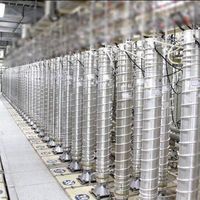The Israeli military intensified its campaign against Hezbollah’s leadership with the July 30 assassination of Fuad Shukr, a key aide to Nasrallah, followed by multiple airstrikes over the next two months that culminated in the killing of the group’s leader on September 27.
The airstrikes targeting the group’s leaders and infrastructure have created new challenges in Hezbollah's financial operations, which could have far-reaching consequences for its military capabilities, an Israeli intelligence official told reporters in a briefing on Sunday.
Iran provides most of Hezbollah’s training, weapons, and funding, sending the group hundreds of millions of dollars each year, according to the US State Department.
"Every month around $50 million comes from Iran to Syria and in Syria, they're transferred to Hezbollah. Some of the money is actually physical dollars, some of it is transferred to Syria through an oil agreement that Iran gives oil to Syria, which is then changed into money in Syria," the Israeli official explained.
The official said the money is also transferred by diplomatic figures coming from Iran to Lebanon through the Beirut International Airport, carrying suitcases of dollars to fund Hezbollah.
“Until about a month ago, Hezbollah's economic situation was pretty steady, because they received the funding from Iran on a very, very clear way every month. It came at the right time over the past few months. After that, a few things changed. They aren't able to receive funding as easily," the senior official said.
'Extreme rise in Hezbollah's expenses'
Disruption in money transfer is not the only financial problem Hezbollah is facing. Israel says the recent campaign against the Lebanese group has extremely increased their payments, as Hezbollah now faces additional financial burdens, including paying for more operatives, weapons, and the damages caused by the airstrikes, according to the Israeli official.
The official warned that Iran could easily resume funding after the war unless Israel systematically targets Hezbollah’s financial network.
The intelligence official made the remarks in a briefing that was held ahead of IDF airstrikes against multiple branches of Qard al-Hasan, a financial institution linked to Hezbollah in Beirut, southern Lebanon, and the Bekaa Valley.
Al-Qard al-Hasan is officially a non-profit charity institution operating outside the Lebanese financial system, and one of the tools by which Hezbollah entrenches its support among the country’s Shia population.
The branches hit by Israeli airstrikes had been evacuated weeks ago, according to pro-Hezbollah media. Therefore, their destruction is not expected to hugely impact Hezbollah’s financial capabilities. However, the target seems to be the Shia community’s trust in Hezbollah.
“The main objective is to is to affect the trust between Hezbollah and a lot of the Shia community that uses this association as a banking system, because economically speaking, a lot of it is based on the fact that there are people using it,” the Israeli official said Sunday.
As Israeli airstrikes continue to target Hezbollah's financial and operational infrastructure, the long-term effects on Hezbollah’s economic stability and military capabilities remain uncertain. However, Israeli officials stress the importance of maintaining pressure to disrupt the group's funding pipeline.
“They are under pressure at this point, but obviously it's something that unless we harm it on a systematic level, it's something that they could recuperate with pretty easily if Iran just gives the funding on the day after war. And that's why it's something that we really have target at this point on it,” the Israeli intelligence official said.
While Hezbollah has lost almost all its commanders and senior leaders in the Israeli airstrikes and targeted assassinations over the past three months, it does not seem to be losing momentum, continuing its daily rocket, missile, and drone attacks against Israel, going as far as hitting the residence of Prime Minister Netanyahu.








